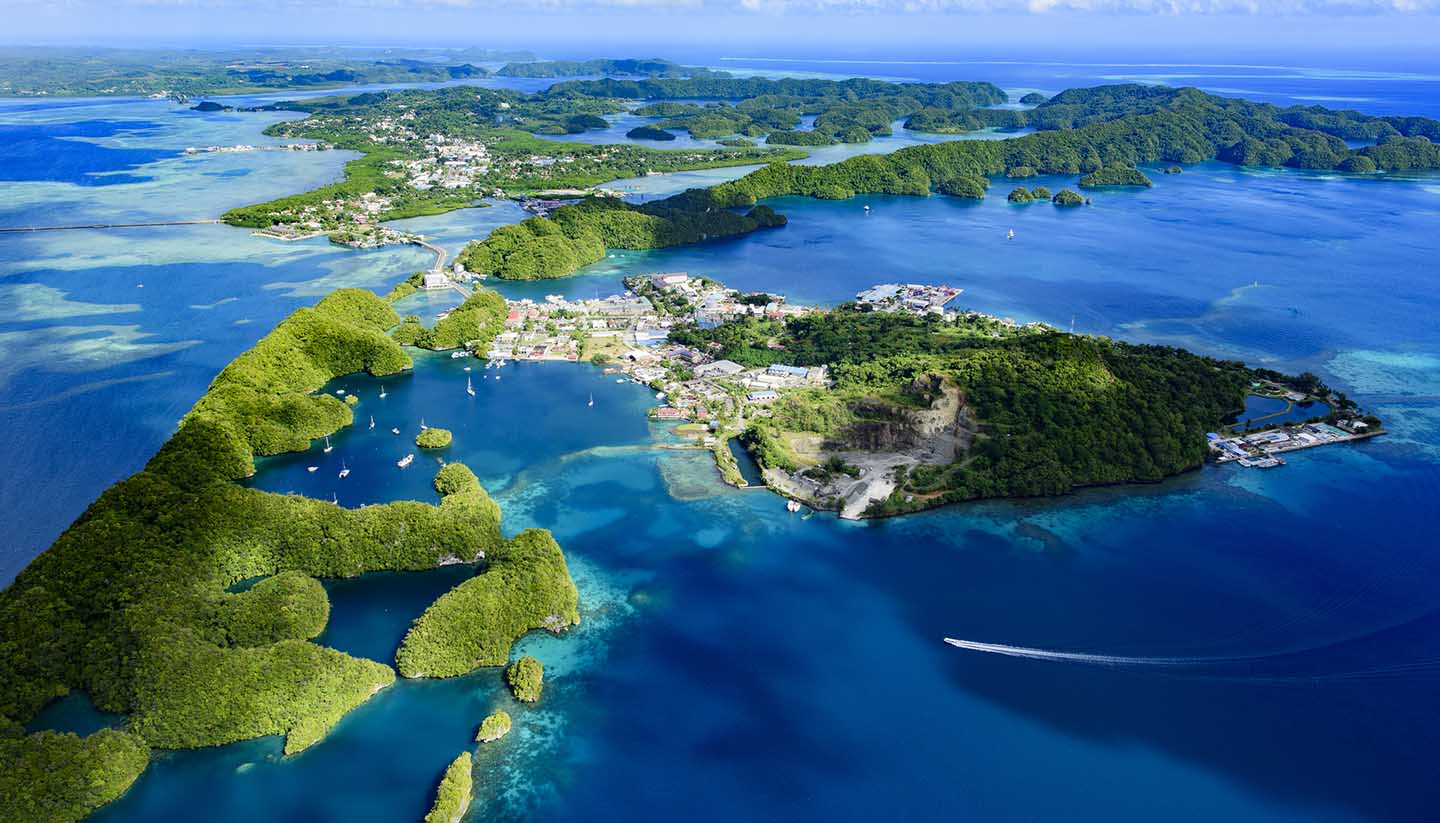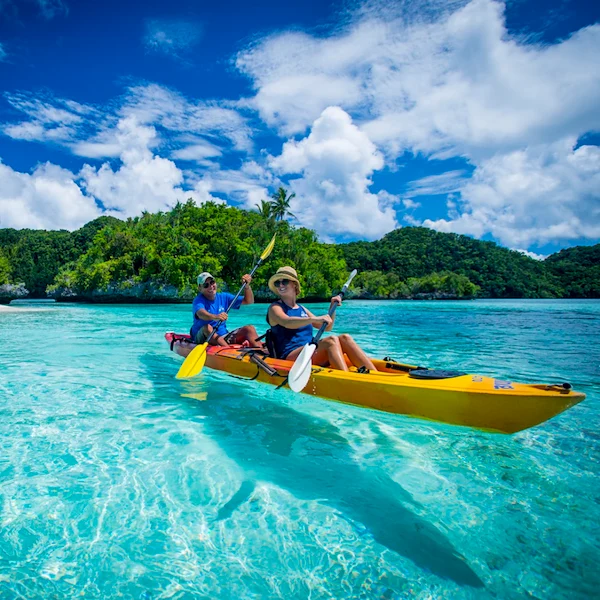
The Republic of Palau is an archipelago of over 300 mostly pristine limestone and volcanic islands located in Micronesia. The unique environment, home to a wide variety of endemic and endangered species, forms the basis of Palau’s cultural and economic life. Much of the population relies on its rich natural resources for subsistence, agri and aquaculture, or in support of the tourism industry, the country’s most significant economic driver. Palau has recognized how critical healthy ecosystems are to its development, and has made considerable efforts to conserve it, becoming an exemplary leader in sustainable development, notable achievements include: Declaring The Rock Islands Southern Lagoon (RISL) the first Palau Protected area in 1956 a UNESCO world heritage site declared in 2012; Designating the worlds first shark sanctuary in 2009, setting in motion a wave of conservation that has since grown to 17 sanctuaries worldwide; Creating in 2015 the World’s Sixth-Largest Marine Sanctuary, covering 500,000 square kilometers (193,000 square miles)—an area bigger than the U.S. state of California.
Since its independence in 1994, Palau has achieved seven of the eight Millennium Development Goals (MDGs) and taken significant, often innovative steps to advance environmental conservation and sustainable tourism development, focusing on a low-impact, high-value tourism model. By 2020, 80% of Palau’s territorial waters will be part of a marine sanctuary, while inland, the Palau Visitors Authority has focused on developing local culinary and community-based tourism through its Alii Pass Programme. In 2017, Palau launched the Palau Pledge, becoming the first country to require all visitors to adhere to certain behavioral guidelines during their trip, and further consolidating the nation’s commitment to protecting and celebrating its unique heritage. With fines up to $1 million for non-compliance, the pledge includes respect for marine and terrestrial environments and local culture, as well as a commitment to support local businesses. Over 150,000 pledges have been made to date with plans to reach two million commitments over the next decade. In recognition of its sustainability efforts, in 2019 Palau received the World’s Top 10 Sustainable Destination Earth Award by Green Destinations, as well as the Pacific Asia Travel Association’s Gold Award for community-based tourism.
Nevertheless, the small island nation recognizes the eminent threat that climate change poses to its development gains, and is seeking global partners to further bolster its efforts to strengthen community resilience through sustainable tourism. Given the alignment of Palau’s historic efforts and future plans with the Coalition of Fragile Ecosystems (COFE)’s focus on utilizing sustainable food and tourism as a means for improving livelihoods and protecting biodiversity, the COFE is an ideal partner for helping to advance Palau’s continued sustainability journey. Collaborating with Sustainable Travel International and Slow Food, the program outlined below aims to build on Palau’s sustainable and community tourism efforts to date in order to ensure the industry continues to generate positive economic, environmental, and sociocultural impacts for Palau’s communities and ecosystems. Doing so is critical to advancing progress on a number of UN sustainable development goals, particularly 1, 2, 8, 12, 13, 14, 15, and 17, as well as FAO’s priority targeted outcomes in the region.
41b64ded-6c03-46c6-bcc2-2bbc3367edd6.jpg?sfvrsn=4a618baf_1)
09100ba7-b6fb-4c21-947b-029dd456a8f1.jpg?sfvrsn=dfd6d084_1)

Activities
A phased approach related to the two aforementioned initiatives is proposed to develop the Palau Sustainable Tourism Value Chain Program, including the following six steps. The first four steps are devoted to evaluating and strengthening sustainability on the supply side, while the last two steps are dedicated to engaging and involving consumers in Palau’s sustainability efforts, and sharing best practices and lessons learned with the global sustainable travel community.
1. Tourism Value Chain Mapping: Working with FAO and tourism counterparts, the team will conduct a tourism value chain mapping exercise to gain a deeper understanding of Palau’s tourism flows, stakeholders, activities, providers, suppliers, and food supply systems. Gaining greater insight into tourism dynamics on the island is critical for both assessing the industry’s carbon footprint, and identifying barriers and opportunities for maximizing gender-inclusive local producer participation and gastronomic heritage value. The results will be utilized to tailor and inform all subsequent program activities, including capacity building needs, identification of potential local blue economy projects, and the carbon calculator as a fundraising mechanism. The mapping study will be carried out in close collaboration with all the local stakeholders and the tools and knowledge needed to replicate and scale out the work will be provided in order to ensure capacity building and sustainability.
Deliverables: Tourism value chain map; estimates and projections of Palau’s tourism industry’s carbon footprint; mapping study of the agricultural and gastronomic biodiversity of Palau and SWOT analysis for enhancing sustainability of local food system and its integration into TVC.
2. Blue Carbon Project Portfolio: In collaboration with the Ministry of Natural Resources, Environment, and Tourism the team will identify and select the carbon offset project portfolio the program aims to support - ie local blue economy women-producer group projects whose activities promote conservation of blue carbon ecosystems. The goal is to prioritize local initiatives wherever possible that not only have high emission reductions potential, but also promote sustainable management of ecosystems, reduce poverty and, at the same time, foster livelihood improvement and economic growth. Step 1 will have helped to identify existing and potential initiatives, activities and projects that do or could meet these criteria. Additionally, the portfolio will be complemented with already established and certified regional blue carbon projects, the selection criteria will be defined with Palau counterparts, but may include: certification & standard, project type and location, communication value, and price. Once portfolio is selected the team will also identify the reporting framework for the projects, which includes the social, economic, and environmental impacts (data and indicators) that should be measured, summarized, and shared on a regular basis.
Deliverables: Palau blue carbon offset projects portfolio, including impact reporting template
3. Sustainable Food Supply Chain: linking of identified local woman-producer groups with tourism providers. Includes building the capacity of the local woman-producer organizations identified as recipients of the carbon offsetting program in Step 2. The aim is to reach the quality and quantity of food supply needed to service the tourism industry while promoting conservation of coastal biodiversity, sustainable production and consumption, transparent and short value chains, and improve women’s participation in agri-food value chains. Key stakeholders will be provided with the knowledge needed to increase the sustainability and marketability of their produce.
Deliverables: Capacity building training modules for key food producers on the needs of the tourism market as well as the importance of biodiversity, ecosystems services and sustainable production systems.
4. Improved Market Access: capacity building of the local woman-producer organizations to strengthen their technical, entrepreneurial and marketing skills, and commercialize and promote their products via tourism providers (hotels, restaurants, chefs, TOs, etc.). This also includes strengthening human impact storytelling abilities for any producer organizations or community projects selected as beneficiaries of the blue carbon offset program during Step 2. Additional modules include capacity building of local tourism providers in developing menus that include local foods as well as marketing local products to the tourism market. Key stakeholders will be provided with the knowledge and key channels through which to provide price premiums on goods produced by systems that generate positive externalities in respect to environmental and socio-economic resilience.
Deliverables: Capacity building modules for key stakeholders on linking sustainable production systems with markets through various methodologies including Slow Food Travel, Chef Alliance and Narrative Label
5. Carbon Calculator: development and design of a custom-made, interactive, consumer facing online platform which allows travelers to measure and offset their carbon footprint associated with travel to and activities while in Palau. The platform will allow travelers to:
1. Calculate the carbon dioxide emissions from planned flights and tourism activities;
2. Generate quotes for offsetting the emissions;
3. Specify a project to offset their carbon emissions against
4. Purchase emissions offsets.
The carbon footprint of traveler’s flights, accommodation and activities will be calculated according to the global standard Greenhouse Gas Protocol, developed by the World Resources Institute (WRI) and World Business Council for Sustainable Development (WBCSD) and the ISO 14064 standard.
Deliverables: Custom-made, traveler facing online carbon footprint calculator for Palau
6. Stakeholder Awareness and Communications: in collaboration with national institutions such as the office of the President and the Bureau of Tourism we will co-organize awareness-raising activities and communications campaigns to socialize visitors and tourism stakeholders to the goals, importance, and impacts of the Palau sustainable tourism program. This will include industry workshops and user guides for participating in and promoting the sustainable tourism value chain initiatives (carbon neutral and local foods programs), and promotion of the sustainable food experiences available to visitors and their importance for local development, preserving biodiversity, cultural heritage and local gastronomy. Ongoing impact reporting on the environmental and social impacts of the carbon offset projects and sharing best practices, tools and experiences with other destinations via COFE, Slow Food, and STI global networks.
Deliverables: Communications and ongoing implementation plan; stakeholder workshops, program launch press release/event, consumer awareness campaign.
Note: Food & Tourism for Fragile Ecosystems is the collective name of all Coalition for Fragile Ecosystems (COFE) demonstration projects. Each project is tailored to the needs of a specific country and area of intervention but all projects share a common focus: the synergy between sustainable tourism and sustainable food systems. At the same time, they promote healthy and balanced diets by strengthening the traditional food systems in combination with innovative dietary elements. They connect small-scale producers with tourism service providers and relevant institutions. Specific attention is given to women, youth and indigenous people’s small enterprises and cooperatives. Building upon the MPP initiative, they help promote high-quality local products and allow visitors to discover and support unique biodiversity while safeguarding indigenous foods and boosting local economies. All projects are developed in collaboration with the relevant national and local governments and with the technical assistance of other members of the Coalition that can provide the needed expertise, such as Slow Food international, Sustainable Travel International and many others.